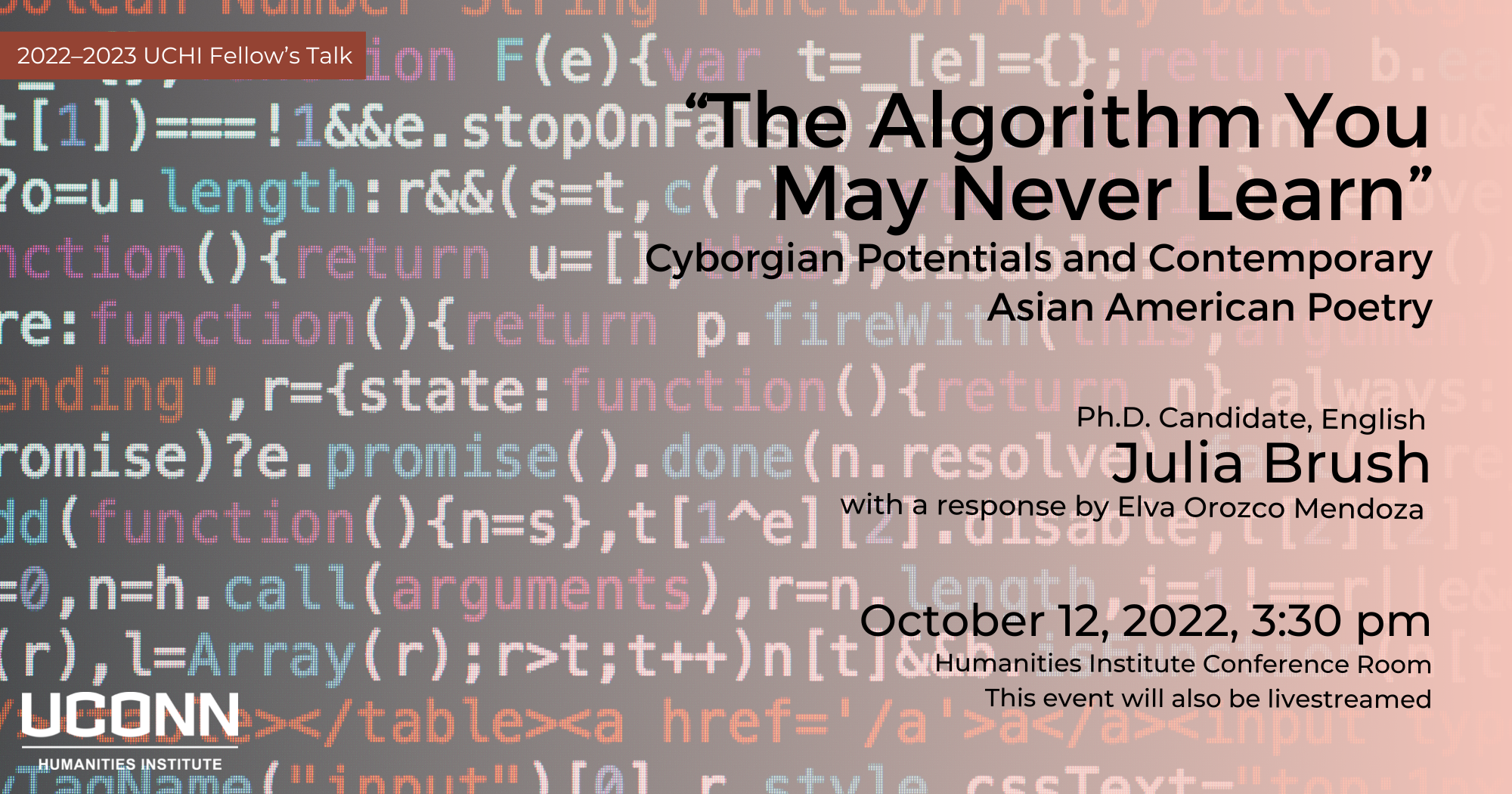‘The Algorithm You May Never Learn:’ Cyborgian Potentials and Contemporary Asian American Poetry
Julia Brush (Ph.D. Candidate, English, UConn)
with a response by Elva Orozco Mendoza (Political Science & WGSS, UConn)
Wednesday, October 12, 2022, 3:30pm, Humanities Institute Conference Room (HBL 4-209)
Add to Google calendar Add to Office 365 calendar Add to other calendar
The event will also be livestreamed with automated captioning.
This talk draws upon the work of queer cartographies, transnational terrains, and refugee poetics to argue that the the digital space, although borderless physically, represents paradoxical spaces of erasure and possibility for marginalized people. Considering contemporary LGBTQ+ Asian American poetry, this talk questions whether the cyborg figure can offer alternative claims for citizenship and subjectivity while centering the exploration of what it means to be human in a digital age in the United States. This inquiry focuses on the work of queer Korean-American poet Margaret Rhee, feminist new media artist, and scholar of ethnic literature, whose poetry employs the perspective of and in the form of cyborg subjects. Acknowledging that “the digital” serves as a globalized site and capitalist-driven enterprise that is both alienating and disenfranchising, this argument nevertheless counters these dystopian visions via the cyborgian potentials envisioned in Rhee’s collection, Love, Robot (The Operating System: 2017). Given that digital and machinated writing can be mimicked to suggest collaborations between AI technology and artists, cyborgian potentials suggest that subjectivities marked through the vectors of race, gender, and sexuality are capable of overwriting the dominant machines of hegemony. I argue that the cyborg figure offers a critical response to the conception of digital subjects as “neutral” or otherwise essentialized and becomes a liberatory figure within recent Asian American poetry.
Julia Brush is a doctoral candidate in English with a graduate certificate in Literary Translation at the University of Connecticut. Her research focuses on contemporary poetry and poetics, queer theory, and transnational American studies, critical refugee studies, and Asian American Studies. While at UCHI, she will complete her dissertation, “State/Less Aesthetics: Queer Cartographies, Transnational Terrains, and Refugee Poetics.”
Elva Orozco Mendoza is an assistant professor, jointly appointed in the Department of Political Science and Women, Gender, and Sexuality Studies with affiliations in El Instituto and the Graduate Certificate in Indigeneity, Race, Ethnicity, and Politics. Her research draws on decolonial feminist thought, critical contract theory, comparative political theory, and feminist analyses on maternal activism in Latin America to examine maternal collective action launched in response to extreme violence—forced disappearance, feminicide, targeted killings, and mass incarceration—in the Americas. Her monograph, tentatively titled The Maternal Contract, examines bottom-up agreements between the victims’ mothers to defend their children against state-led and state-enabled violence and criminalization. It argues that mothers’ collectives in the Americas constitute powerful political actors seeking to problematize and counter the normalization of disposable life. By theorizing the maternal contract, this current research contributes to ongoing initiatives to decolonize Western political theory by attending to subaltern actors’ actions and political ideas. Her research addresses major concerns of humanist scholarship, namely how marginalized political actors resist top-down attempts to expel them from the realm of citizenship and humanity.
Access note
If you require accommodation to attend this event, please contact us at uchi@uconn.edu or by phone (860) 486-9057. We can request ASL interpretation, computer-assisted real time transcription, and other accommodations offered by the Center for Students with Disabilities.


